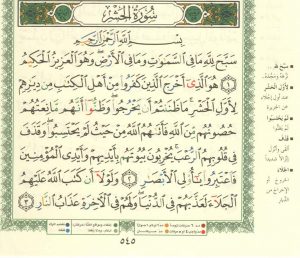Surah Hashr
Contents
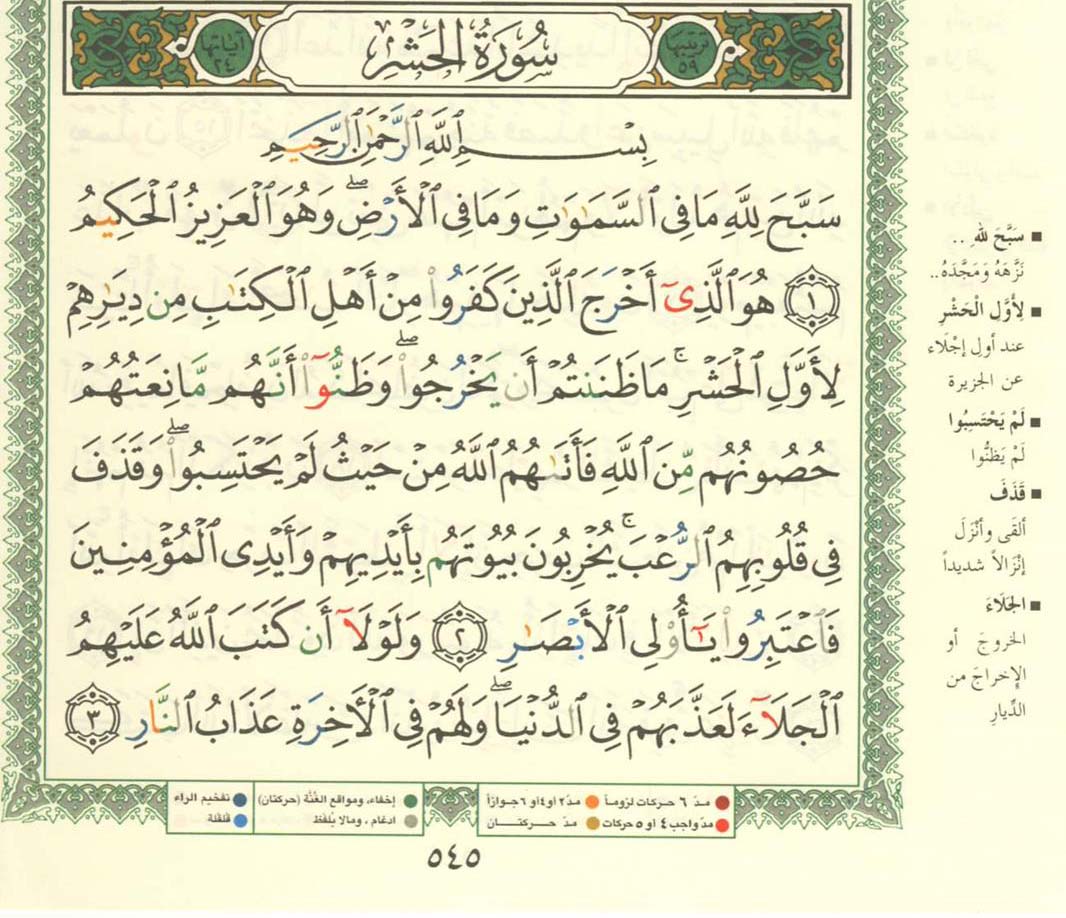
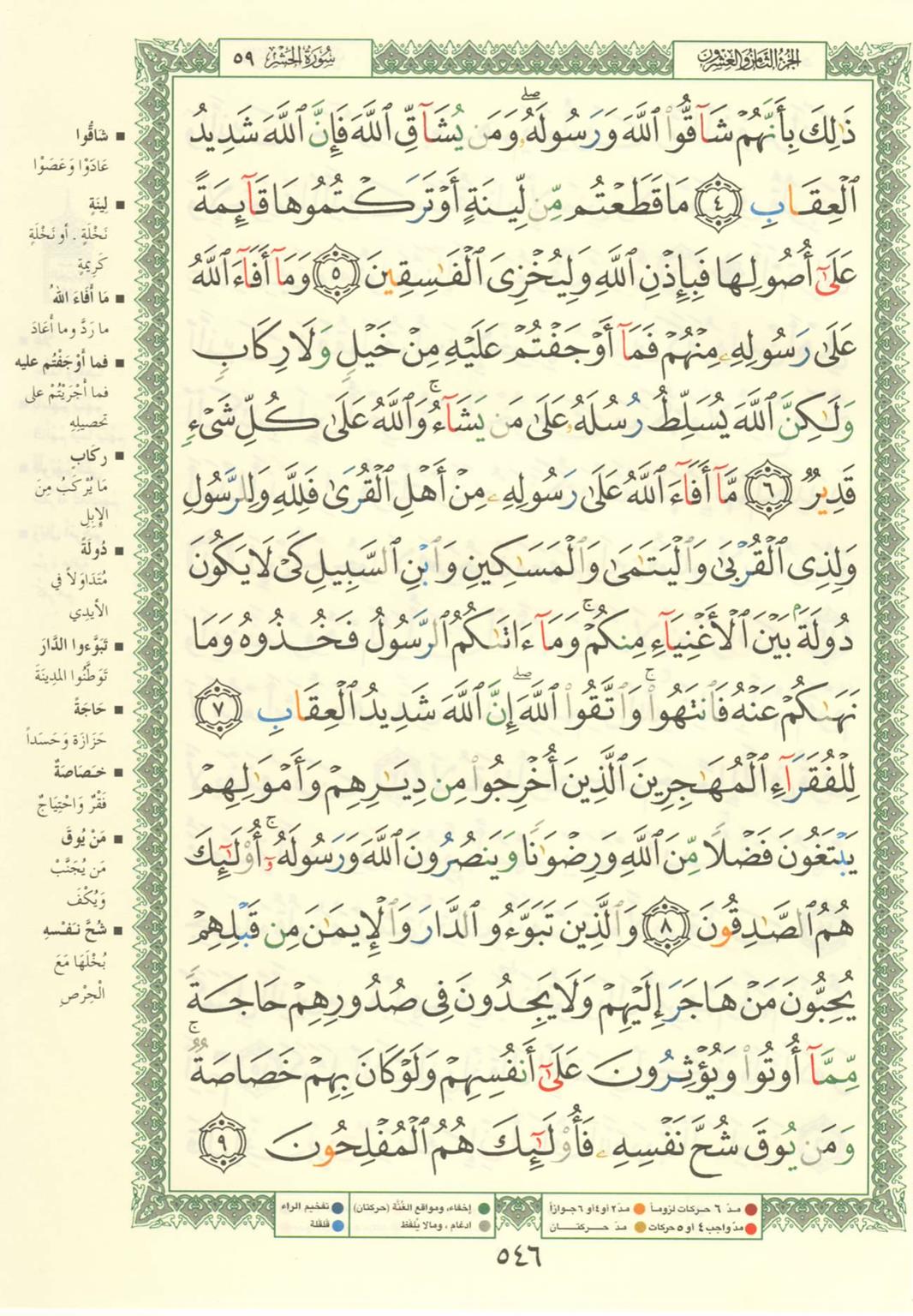
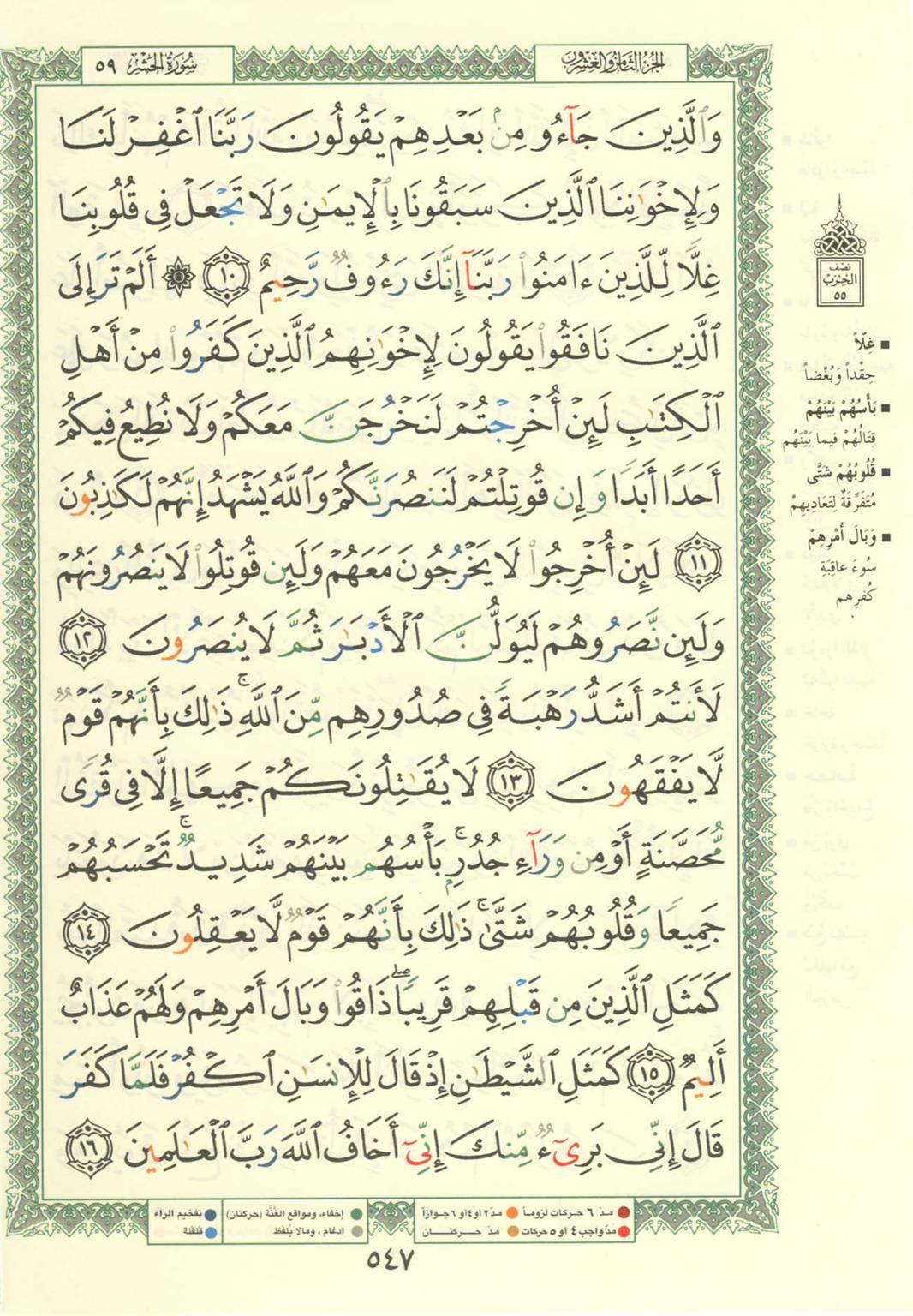
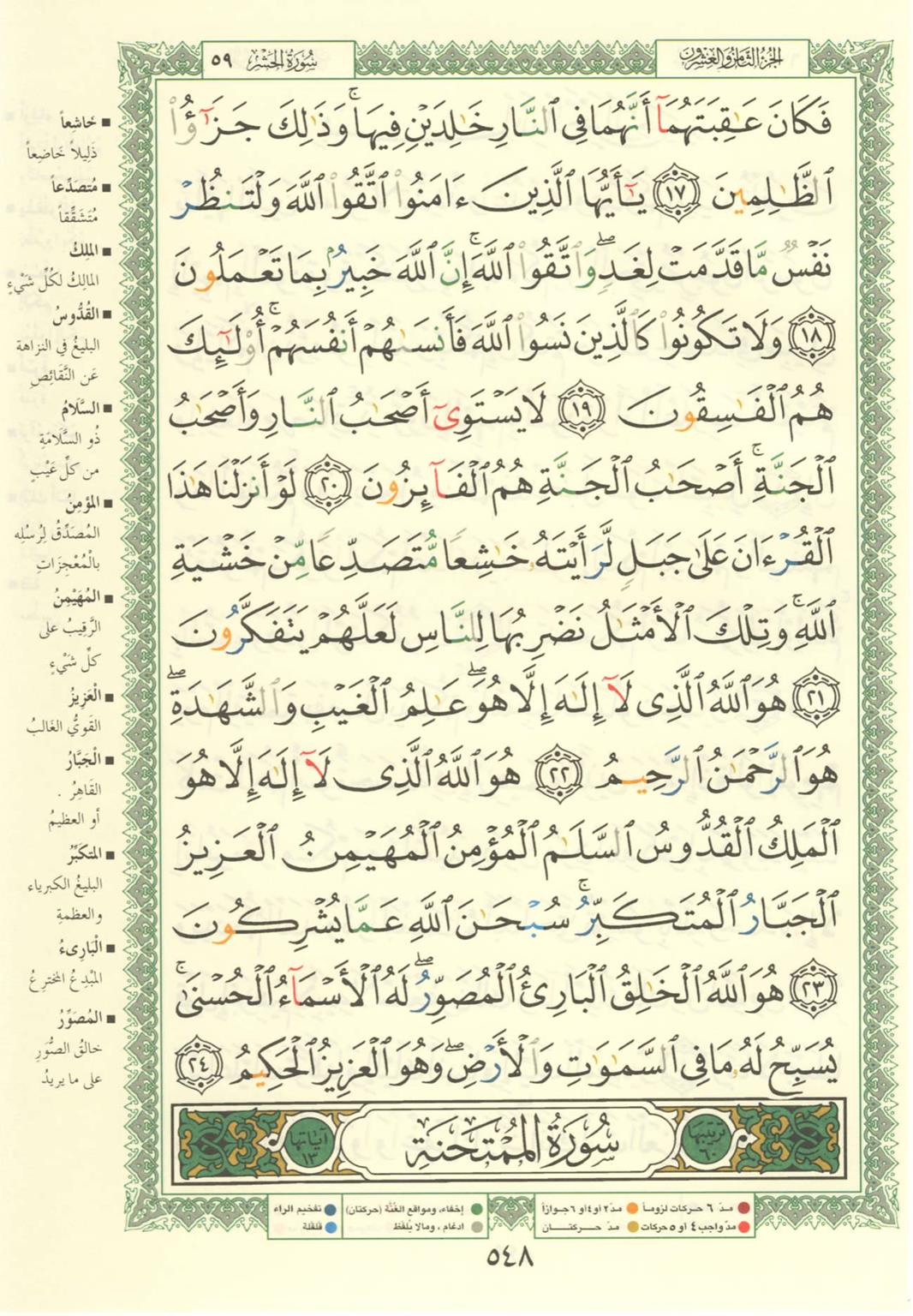
Page 545
59:1
س-ب-ح
![]() سَبَّحَ
سَبَّحَ
sabbaḥa
Glorifies
سَبَّحَ
سَبَّحَ
sabbaḥa
Glorifies
ا-ل-ه
![]() لِلَّهِ
لِلّٰهِ
lillahi
[to] Allah
لِلَّهِ
لِلّٰهِ
lillahi
[to] Allah
م-ا
![]() مَا
مَا
mā
whatever
مَا
مَا
mā
whatever
ف-ي
![]() فِي
فِی
fī
(is) in
فِي
فِی
fī
(is) in
س-م-و
![]() ٱلسَّمَٰوَٰتِ
السَّمٰوٰتِ
s-samāwāti
the heavens
ٱلسَّمَٰوَٰتِ
السَّمٰوٰتِ
s-samāwāti
the heavens
م-ا
![]() وَمَا
وَمَا
wamā
and whatever
وَمَا
وَمَا
wamā
and whatever
ف-ي
![]() فِي
فِی
fī
(is) in
فِي
فِی
fī
(is) in
ا-ر-ض
![]() ٱلۡأَرۡضِۖ
الْاَرْضِ ۚ—
l-arḍi
the earth.
ٱلۡأَرۡضِۖ
الْاَرْضِ ۚ—
l-arḍi
the earth.
ه-و
![]() وَهُوَ
وَهُوَ
wahuwa
And He
وَهُوَ
وَهُوَ
wahuwa
And He
ع-ز-ز
![]() ٱلۡعَزِيزُ
الْعَزِیْزُ
l-ʿazīzu
(is) the All-Mighty,
ٱلۡعَزِيزُ
الْعَزِیْزُ
l-ʿazīzu
(is) the All-Mighty,
ح-ك-م
![]() ٱلۡحَكِيمُ
الْحَكِیْمُ
l-ḥakīmu
the All-Wise.
ٱلۡحَكِيمُ
الْحَكِیْمُ
l-ḥakīmu
the All-Wise.
59:2
ه-و
![]() هُوَ
هُوَ
huwa
He
هُوَ
هُوَ
huwa
He
ا-ل-ل-ذ
![]() ٱلَّذِيٓ
الَّذِیْۤ
alladhī
(is) the One Who
ٱلَّذِيٓ
الَّذِیْۤ
alladhī
(is) the One Who
خ-ر-ج
![]() أَخۡرَجَ
اَخْرَجَ
akhraja
expelled
أَخۡرَجَ
اَخْرَجَ
akhraja
expelled
ا-ل-ل-ذ
![]() ٱلَّذِينَ
الَّذِیْنَ
alladhīna
those who
ٱلَّذِينَ
الَّذِیْنَ
alladhīna
those who
ك-ف-ر
![]() كَفَرُواْ
كَفَرُوْا
kafarū
disbelieved
كَفَرُواْ
كَفَرُوْا
kafarū
disbelieved
م-ن
![]() مِنۡ
مِنْ
min
from
مِنۡ
مِنْ
min
from
ا-ه-ل
![]() أَهۡلِ
اَهْلِ
ahli
(the) People
أَهۡلِ
اَهْلِ
ahli
(the) People
ك-ت-ب
![]() ٱلۡكِتَٰبِ
الْكِتٰبِ
l-kitābi
(of) the Scripture
ٱلۡكِتَٰبِ
الْكِتٰبِ
l-kitābi
(of) the Scripture
م-ن
![]() مِن
مِنْ
min
from
مِن
مِنْ
min
from
د-و-ر
![]() دِيَٰرِهِمۡ
دِیَارِهِمْ
diyārihim
their homes
دِيَٰرِهِمۡ
دِیَارِهِمْ
diyārihim
their homes
ا-و-ل
![]() لِأَوَّلِ
لِاَوَّلِ
li-awwali
at (the) first
لِأَوَّلِ
لِاَوَّلِ
li-awwali
at (the) first
ح-ش-ر
![]() ٱلۡحَشۡرِۚ
الْحَشْرِ ؔؕ—
l-ḥashri
gathering.
ٱلۡحَشۡرِۚ
الْحَشْرِ ؔؕ—
l-ḥashri
gathering.
م-ا
![]() مَا
مَا
mā
Not
مَا
مَا
mā
Not
ظ-ن-ن
![]() ظَنَنتُمۡ
ظَنَنْتُمْ
ẓanantum
you think
ظَنَنتُمۡ
ظَنَنْتُمْ
ẓanantum
you think
ا-ن
![]() أَن
اَنْ
an
that
أَن
اَنْ
an
that
خ-ر-ج
![]() يَخۡرُجُواْۖ
یَّخْرُجُوْا
yakhrujū
they would leave,
يَخۡرُجُواْۖ
یَّخْرُجُوْا
yakhrujū
they would leave,
ظ-ن-ن
![]() وَظَنُّوٓاْ
وَظَنُّوْۤا
waẓannū
and they thought
وَظَنُّوٓاْ
وَظَنُّوْۤا
waẓannū
and they thought
ا-ن-ن
![]() أَنَّهُم
اَنَّهُمْ
annahum
that [they]
أَنَّهُم
اَنَّهُمْ
annahum
that [they]
م-ن-ع
![]() مَّانِعَتُهُمۡ
مَّانِعَتُهُمْ
māniʿatuhum
would defend them
مَّانِعَتُهُمۡ
مَّانِعَتُهُمْ
māniʿatuhum
would defend them
ح-ص-ن
![]() حُصُونُهُم
حُصُوْنُهُمْ
ḥuṣūnuhum
their fortresses
حُصُونُهُم
حُصُوْنُهُمْ
ḥuṣūnuhum
their fortresses
م-ن
![]() مِّنَ
مِّنَ
mina
against
مِّنَ
مِّنَ
mina
against
ا-ل-ه
![]() ٱللَّهِ
اللّٰهِ
l-lahi
Allah.
ٱللَّهِ
اللّٰهِ
l-lahi
Allah.
ا-ت-ي
![]() فَأَتَىٰهُمُ
فَاَتٰىهُمُ
fa-atāhumu
But Allah came to them
فَأَتَىٰهُمُ
فَاَتٰىهُمُ
fa-atāhumu
But Allah came to them
ا-ل-ه
![]() ٱللَّهُ
اللّٰهُ
l-lahu
But Allah came to them
ٱللَّهُ
اللّٰهُ
l-lahu
But Allah came to them
م-ن
![]() مِنۡ
مِنْ
min
from
مِنۡ
مِنْ
min
from
ح-ي-ث
![]() حَيۡثُ
حَیْثُ
ḥaythu
where
حَيۡثُ
حَیْثُ
ḥaythu
where
ل-م
![]() لَمۡ
لَمْ
lam
not
لَمۡ
لَمْ
lam
not
ح-س-ب
![]() يَحۡتَسِبُواْۖ
یَحْتَسِبُوْا
yaḥtasibū
they expected,
يَحۡتَسِبُواْۖ
یَحْتَسِبُوْا
yaḥtasibū
they expected,
ق-ذ-ف
![]() وَقَذَفَ
وَقَذَفَ
waqadhafa
and He cast
وَقَذَفَ
وَقَذَفَ
waqadhafa
and He cast
ف-ي
![]() فِي
فِیْ
fī
into
فِي
فِیْ
fī
into
ق-ل-ب
![]() قُلُوبِهِمُ
قُلُوْبِهِمُ
qulūbihimu
their hearts
قُلُوبِهِمُ
قُلُوْبِهِمُ
qulūbihimu
their hearts
ر-ع-ب
![]() ٱلرُّعۡبَۚ
الرُّعْبَ
r-ruʿ'ba
[the] terror,
ٱلرُّعۡبَۚ
الرُّعْبَ
r-ruʿ'ba
[the] terror,
خ-ر-ب
![]() يُخۡرِبُونَ
یُخْرِبُوْنَ
yukh'ribūna
they destroyed
يُخۡرِبُونَ
یُخْرِبُوْنَ
yukh'ribūna
they destroyed
ب-ي-ت
![]() بُيُوتَهُم
بُیُوْتَهُمْ
buyūtahum
their houses
بُيُوتَهُم
بُیُوْتَهُمْ
buyūtahum
their houses
ي-د-ي
![]() بِأَيۡدِيهِمۡ
بِاَیْدِیْهِمْ
bi-aydīhim
with their hands
بِأَيۡدِيهِمۡ
بِاَیْدِیْهِمْ
bi-aydīhim
with their hands
ي-د-ي
![]() وَأَيۡدِي
وَاَیْدِی
wa-aydī
and the hands
وَأَيۡدِي
وَاَیْدِی
wa-aydī
and the hands
ا-م-ن
![]() ٱلۡمُؤۡمِنِينَ
الْمُؤْمِنِیْنَ ۗ—
l-mu'minīna
(of) the believers.
ٱلۡمُؤۡمِنِينَ
الْمُؤْمِنِیْنَ ۗ—
l-mu'minīna
(of) the believers.
ع-ب-ر
![]() فَٱعۡتَبِرُواْ
فَاعْتَبِرُوْا
fa-iʿ'tabirū
So take a lesson,
فَٱعۡتَبِرُواْ
فَاعْتَبِرُوْا
fa-iʿ'tabirū
So take a lesson,
ا-و-ل
![]() يَٰٓأُوْلِي
یٰۤاُولِی
yāulī
O those endowed with
يَٰٓأُوْلِي
یٰۤاُولِی
yāulī
O those endowed with
ب-ص-ر
![]() ٱلۡأَبۡصَٰرِ
الْاَبْصَارِ
l-abṣāri
O those endowed with
ٱلۡأَبۡصَٰرِ
الْاَبْصَارِ
l-abṣāri
O those endowed with
59:3
ل-و-ل-ا
![]() وَلَوۡلَآ
وَلَوْلَاۤ
walawlā
And if not
وَلَوۡلَآ
وَلَوْلَاۤ
walawlā
And if not
ا-ن
![]() أَن
اَنْ
an
[that]
أَن
اَنْ
an
[that]
ك-ت-ب
![]() كَتَبَ
كَتَبَ
kataba
Allah (had) decreed
كَتَبَ
كَتَبَ
kataba
Allah (had) decreed
ا-ل-ه
![]() ٱللَّهُ
اللّٰهُ
l-lahu
Allah (had) decreed
ٱللَّهُ
اللّٰهُ
l-lahu
Allah (had) decreed
ع-ل-ي
![]() عَلَيۡهِمُ
عَلَیْهِمُ
ʿalayhimu
for them
عَلَيۡهِمُ
عَلَیْهِمُ
ʿalayhimu
for them
ج-ل-ي
![]() ٱلۡجَلَآءَ
الْجَلَآءَ
l-jalāa
the exile,
ٱلۡجَلَآءَ
الْجَلَآءَ
l-jalāa
the exile,
ع-ذ-ب
![]() لَعَذَّبَهُمۡ
لَعَذَّبَهُمْ
laʿadhabahum
certainly He (would) have punished them
لَعَذَّبَهُمۡ
لَعَذَّبَهُمْ
laʿadhabahum
certainly He (would) have punished them
ف-ي
![]() فِي
فِی
fī
in
فِي
فِی
fī
in
د-ن-و
![]() ٱلدُّنۡيَاۖ
الدُّنْیَا ؕ—
d-dun'yā
the world,
ٱلدُّنۡيَاۖ
الدُّنْیَا ؕ—
d-dun'yā
the world,
ل
![]() وَلَهُمۡ
وَلَهُمْ
walahum
and for them
وَلَهُمۡ
وَلَهُمْ
walahum
and for them
ف-ي
![]() فِي
فِی
fī
in
فِي
فِی
fī
in
ا-خ-ر
![]() ٱلۡأٓخِرَةِ
الْاٰخِرَةِ
l-ākhirati
the Hereafter
ٱلۡأٓخِرَةِ
الْاٰخِرَةِ
l-ākhirati
the Hereafter
ع-ذ-ب
![]() عَذَابُ
عَذَابُ
ʿadhābu
(is) a punishment
عَذَابُ
عَذَابُ
ʿadhābu
(is) a punishment
ن-و-ر
![]() ٱلنَّارِ
النَّارِ
n-nāri
(of) the Fire.
ٱلنَّارِ
النَّارِ
n-nāri
(of) the Fire.
59:4
ذ-ل-ك
![]() ذَٰلِكَ
ذٰلِكَ
dhālika
That
ذَٰلِكَ
ذٰلِكَ
dhālika
That
ا-ن-ن
![]() بِأَنَّهُمۡ
بِاَنَّهُمْ
bi-annahum
(is) because [they]
بِأَنَّهُمۡ
بِاَنَّهُمْ
bi-annahum
(is) because [they]
ش-ق-ق
![]() شَآقُّواْ
شَآقُّوا
shāqqū
they opposed
شَآقُّواْ
شَآقُّوا
shāqqū
they opposed
ا-ل-ه
![]() ٱللَّهَ
اللّٰهَ
l-laha
Allah
ٱللَّهَ
اللّٰهَ
l-laha
Allah
ر-س-ل
![]() وَرَسُولَهُۥۖ
وَرَسُوْلَهٗ ۚ—
warasūlahu
and His Messenger.
وَرَسُولَهُۥۖ
وَرَسُوْلَهٗ ۚ—
warasūlahu
and His Messenger.
م-ن
![]() وَمَن
وَمَنْ
waman
And whoever
وَمَن
وَمَنْ
waman
And whoever
ش-ق-ق
![]() يُشَآقِّ
یُّشَآقِّ
yushāqqi
opposes
يُشَآقِّ
یُّشَآقِّ
yushāqqi
opposes
ا-ل-ه
![]() ٱللَّهَ
اللّٰهَ
l-laha
Allah
ٱللَّهَ
اللّٰهَ
l-laha
Allah
ا-ن-ن
![]() فَإِنَّ
فَاِنَّ
fa-inna
then indeed,
فَإِنَّ
فَاِنَّ
fa-inna
then indeed,
ا-ل-ه
![]() ٱللَّهَ
اللّٰهَ
l-laha
Allah
ٱللَّهَ
اللّٰهَ
l-laha
Allah
ش-د-د
![]() شَدِيدُ
شَدِیْدُ
shadīdu
(is) severe
شَدِيدُ
شَدِیْدُ
shadīdu
(is) severe
ع-ق-ب
![]() ٱلۡعِقَابِ
الْعِقَابِ
l-ʿiqābi
(in) penalty.
ٱلۡعِقَابِ
الْعِقَابِ
l-ʿiqābi
(in) penalty.
59:5
م-ا
![]() مَا
مَا
mā
Whatever
مَا
مَا
mā
Whatever
ق-ط-ع
![]() قَطَعۡتُم
قَطَعْتُمْ
qaṭaʿtum
you cut down
قَطَعۡتُم
قَطَعْتُمْ
qaṭaʿtum
you cut down
م-ن
![]() مِّن
مِّنْ
min
of
مِّن
مِّنْ
min
of
ل-ي-ن
![]() لِّينَةٍ
لِّیْنَةٍ
līnatin
(the) palm-trees
لِّينَةٍ
لِّیْنَةٍ
līnatin
(the) palm-trees
ا-و
![]() أَوۡ
اَوْ
aw
or
أَوۡ
اَوْ
aw
or
ت-ر-ك
![]() تَرَكۡتُمُوهَا
تَرَكْتُمُوْهَا
taraktumūhā
you left them
تَرَكۡتُمُوهَا
تَرَكْتُمُوْهَا
taraktumūhā
you left them
ق-و-م
![]() قَآئِمَةً
قَآىِٕمَةً
qāimatan
standing
قَآئِمَةً
قَآىِٕمَةً
qāimatan
standing
ع-ل-ي
![]() عَلَىٰٓ
عَلٰۤی
ʿalā
on
عَلَىٰٓ
عَلٰۤی
ʿalā
on
ا-ص-ل
![]() أُصُولِهَا
اُصُوْلِهَا
uṣūlihā
their roots,
أُصُولِهَا
اُصُوْلِهَا
uṣūlihā
their roots,
ا-ذ-ن
![]() فَبِإِذۡنِ
فَبِاِذْنِ
fabi-idh'ni
it (was) by the permission
فَبِإِذۡنِ
فَبِاِذْنِ
fabi-idh'ni
it (was) by the permission
ا-ل-ه
![]() ٱللَّهِ
اللّٰهِ
l-lahi
(of) Allah,
ٱللَّهِ
اللّٰهِ
l-lahi
(of) Allah,
خ-ز-ي
![]() وَلِيُخۡزِيَ
وَلِیُخْزِیَ
waliyukh'ziya
and that He may disgrace
وَلِيُخۡزِيَ
وَلِیُخْزِیَ
waliyukh'ziya
and that He may disgrace
ف-س-ق
![]() ٱلۡفَٰسِقِينَ
الْفٰسِقِیْنَ
l-fāsiqīna
the defiantly disobedient.
ٱلۡفَٰسِقِينَ
الْفٰسِقِیْنَ
l-fāsiqīna
the defiantly disobedient.
59:6
م-ا
![]() وَمَآ
وَمَاۤ
wamā
And what
وَمَآ
وَمَاۤ
wamā
And what
ف-ي-ا
![]() أَفَآءَ
اَفَآءَ
afāa
Allah restored
أَفَآءَ
اَفَآءَ
afāa
Allah restored
ا-ل-ه
![]() ٱللَّهُ
اللّٰهُ
l-lahu
Allah restored
ٱللَّهُ
اللّٰهُ
l-lahu
Allah restored
ع-ل-ي
![]() عَلَىٰ
عَلٰی
ʿalā
to
عَلَىٰ
عَلٰی
ʿalā
to
ر-س-ل
![]() رَسُولِهِۦ
رَسُوْلِهٖ
rasūlihi
His Messenger
رَسُولِهِۦ
رَسُوْلِهٖ
rasūlihi
His Messenger
م-ن
![]() مِنۡهُمۡ
مِنْهُمْ
min'hum
from them,
مِنۡهُمۡ
مِنْهُمْ
min'hum
from them,
م-ا
![]() فَمَآ
فَمَاۤ
famā
then not
فَمَآ
فَمَاۤ
famā
then not
و-ج-ف
![]() أَوۡجَفۡتُمۡ
اَوْجَفْتُمْ
awjaftum
you made expedition
أَوۡجَفۡتُمۡ
اَوْجَفْتُمْ
awjaftum
you made expedition
ع-ل-ي
![]() عَلَيۡهِ
عَلَیْهِ
ʿalayhi
for it
عَلَيۡهِ
عَلَیْهِ
ʿalayhi
for it
م-ن
![]() مِنۡ
مِنْ
min
of
مِنۡ
مِنْ
min
of
خ-ي-ل
![]() خَيۡلٖ
خَیْلٍ
khaylin
horses
خَيۡلٖ
خَیْلٍ
khaylin
horses
ل-ا
![]() وَلَا
وَّلَا
walā
and not
وَلَا
وَّلَا
walā
and not
ر-ك-ب
![]() رِكَابٖ
رِكَابٍ
rikābin
camels,
رِكَابٖ
رِكَابٍ
rikābin
camels,
ل-ك-ن
![]() وَلَٰكِنَّ
وَّلٰكِنَّ
walākinna
but
وَلَٰكِنَّ
وَّلٰكِنَّ
walākinna
but
ا-ل-ه
![]() ٱللَّهَ
اللّٰهَ
l-laha
Allah
ٱللَّهَ
اللّٰهَ
l-laha
Allah
س-ل-ط
![]() يُسَلِّطُ
یُسَلِّطُ
yusalliṭu
gives power
يُسَلِّطُ
یُسَلِّطُ
yusalliṭu
gives power
ر-س-ل
![]() رُسُلَهُۥ
رُسُلَهٗ
rusulahu
(to) His Messengers
رُسُلَهُۥ
رُسُلَهٗ
rusulahu
(to) His Messengers
ع-ل-ي
![]() عَلَىٰ
عَلٰی
ʿalā
over
عَلَىٰ
عَلٰی
ʿalā
over
م-ن
![]() مَن
مَنْ
man
whom
مَن
مَنْ
man
whom
ش-ي-ا
![]() يَشَآءُۚ
یَّشَآءُ ؕ—
yashāu
He wills.
يَشَآءُۚ
یَّشَآءُ ؕ—
yashāu
He wills.
ا-ل-ه
![]() وَٱللَّهُ
وَاللّٰهُ
wal-lahu
And Allah
وَٱللَّهُ
وَاللّٰهُ
wal-lahu
And Allah
ع-ل-ي
![]() عَلَىٰ
عَلٰی
ʿalā
(is) on
عَلَىٰ
عَلٰی
ʿalā
(is) on
ك-ل-ل
![]() كُلِّ
كُلِّ
kulli
every
كُلِّ
كُلِّ
kulli
every
ش-ي-ا
![]() شَيۡءٖ
شَیْءٍ
shayin
thing
شَيۡءٖ
شَیْءٍ
shayin
thing
ق-د-ر
![]() قَدِيرٞ
قَدِیْرٌ
qadīrun
All-Powerful.
قَدِيرٞ
قَدِیْرٌ
qadīrun
All-Powerful.
59:7
م-ا
![]() مَّآ
مَاۤ
mā
What
مَّآ
مَاۤ
mā
What
ف-ي-ا
![]() أَفَآءَ
اَفَآءَ
afāa
Allah restored
أَفَآءَ
اَفَآءَ
afāa
Allah restored
ا-ل-ه
![]() ٱللَّهُ
اللّٰهُ
l-lahu
Allah restored
ٱللَّهُ
اللّٰهُ
l-lahu
Allah restored
ع-ل-ي
![]() عَلَىٰ
عَلٰی
ʿalā
to
عَلَىٰ
عَلٰی
ʿalā
to
ر-س-ل
![]() رَسُولِهِۦ
رَسُوْلِهٖ
rasūlihi
His Messenger
رَسُولِهِۦ
رَسُوْلِهٖ
rasūlihi
His Messenger
م-ن
![]() مِنۡ
مِنْ
min
from
مِنۡ
مِنْ
min
from
ا-ه-ل
![]() أَهۡلِ
اَهْلِ
ahli
(the) people
أَهۡلِ
اَهْلِ
ahli
(the) people
ق-ر-ي
![]() ٱلۡقُرَىٰ
الْقُرٰی
l-qurā
(of) the towns,
ٱلۡقُرَىٰ
الْقُرٰی
l-qurā
(of) the towns,
ا-ل-ه
![]() فَلِلَّهِ
فَلِلّٰهِ
falillahi
(it is) for Allah
فَلِلَّهِ
فَلِلّٰهِ
falillahi
(it is) for Allah
ر-س-ل
![]() وَلِلرَّسُولِ
وَلِلرَّسُوْلِ
walilrrasūli
and His Messenger
وَلِلرَّسُولِ
وَلِلرَّسُوْلِ
walilrrasūli
and His Messenger
ذ-و
![]() وَلِذِي
وَلِذِی
walidhī
and for the kindred
وَلِذِي
وَلِذِی
walidhī
and for the kindred
ق-ر-ب
![]() ٱلۡقُرۡبَىٰ
الْقُرْبٰی
l-qur'bā
and for the kindred
ٱلۡقُرۡبَىٰ
الْقُرْبٰی
l-qur'bā
and for the kindred
ي-ت-م
![]() وَٱلۡيَتَٰمَىٰ
وَالْیَتٰمٰی
wal-yatāmā
and the orphans
وَٱلۡيَتَٰمَىٰ
وَالْیَتٰمٰی
wal-yatāmā
and the orphans
س-ك-ن
![]() وَٱلۡمَسَٰكِينِ
وَالْمَسٰكِیْنِ
wal-masākīni
and the needy
وَٱلۡمَسَٰكِينِ
وَالْمَسٰكِیْنِ
wal-masākīni
and the needy
ب-ن-و
![]() وَٱبۡنِ
وَابْنِ
wa-ib'ni
and the wayfarer,
وَٱبۡنِ
وَابْنِ
wa-ib'ni
and the wayfarer,
س-ب-ل
![]() ٱلسَّبِيلِ
السَّبِیْلِ ۙ—
s-sabīli
and the wayfarer,
ٱلسَّبِيلِ
السَّبِیْلِ ۙ—
s-sabīli
and the wayfarer,
ك-ي
![]() كَيۡ
كَیْ
kay
that
كَيۡ
كَیْ
kay
that
ل-ا
![]() لَا
لَا
lā
not
لَا
لَا
lā
not
ك-و-ن
![]() يَكُونَ
یَكُوْنَ
yakūna
it becomes
يَكُونَ
یَكُوْنَ
yakūna
it becomes
د-و-ل
![]() دُولَةَۢ
دُوْلَةً
dūlatan
a (perpetual) circulation
دُولَةَۢ
دُوْلَةً
dūlatan
a (perpetual) circulation
ب-ي-ن
![]() بَيۡنَ
بَیْنَ
bayna
between
بَيۡنَ
بَیْنَ
bayna
between
غ-ن-ي
![]() ٱلۡأَغۡنِيَآءِ
الْاَغْنِیَآءِ
l-aghniyāi
the rich
ٱلۡأَغۡنِيَآءِ
الْاَغْنِیَآءِ
l-aghniyāi
the rich
م-ن
![]() مِنكُمۡۚ
مِنْكُمْ ؕ—
minkum
among you.
مِنكُمۡۚ
مِنْكُمْ ؕ—
minkum
among you.
م-ا
![]() وَمَآ
وَمَاۤ
wamā
And whatever
وَمَآ
وَمَاۤ
wamā
And whatever
ا-ت-ي
![]() ءَاتَىٰكُمُ
اٰتٰىكُمُ
ātākumu
gives you
ءَاتَىٰكُمُ
اٰتٰىكُمُ
ātākumu
gives you
ر-س-ل
![]() ٱلرَّسُولُ
الرَّسُوْلُ
r-rasūlu
the Messenger,
ٱلرَّسُولُ
الرَّسُوْلُ
r-rasūlu
the Messenger,
ا-خ-ذ
![]() فَخُذُوهُ
فَخُذُوْهُ ۗ—
fakhudhūhu
take it
فَخُذُوهُ
فَخُذُوْهُ ۗ—
fakhudhūhu
take it
م-ا
![]() وَمَا
وَمَا
wamā
and whatever
وَمَا
وَمَا
wamā
and whatever
ن-ه-ي
![]() نَهَىٰكُمۡ
نَهٰىكُمْ
nahākum
he forbids you
نَهَىٰكُمۡ
نَهٰىكُمْ
nahākum
he forbids you
ع-ن
![]() عَنۡهُ
عَنْهُ
ʿanhu
from it,
عَنۡهُ
عَنْهُ
ʿanhu
from it,
ن-ه-ي
![]() فَٱنتَهُواْۚ
فَانْتَهُوْا ۚ—
fa-intahū
refrain.
فَٱنتَهُواْۚ
فَانْتَهُوْا ۚ—
fa-intahū
refrain.
و-ق-ي
![]() وَٱتَّقُواْ
وَاتَّقُوا
wa-ittaqū
And fear
وَٱتَّقُواْ
وَاتَّقُوا
wa-ittaqū
And fear
ا-ل-ه
![]() ٱللَّهَۖ
اللّٰهَ ؕ—
l-laha
Allah.
ٱللَّهَۖ
اللّٰهَ ؕ—
l-laha
Allah.
ا-ن-ن
![]() إِنَّ
اِنَّ
inna
Indeed,
إِنَّ
اِنَّ
inna
Indeed,
ا-ل-ه
![]() ٱللَّهَ
اللّٰهَ
l-laha
Allah
ٱللَّهَ
اللّٰهَ
l-laha
Allah
ش-د-د
![]() شَدِيدُ
شَدِیْدُ
shadīdu
(is) severe
شَدِيدُ
شَدِیْدُ
shadīdu
(is) severe
ع-ق-ب
![]() ٱلۡعِقَابِ
الْعِقَابِ
l-ʿiqābi
(in) penalty.
ٱلۡعِقَابِ
الْعِقَابِ
l-ʿiqābi
(in) penalty.
59:8
ف-ق-ر
![]() لِلۡفُقَرَآءِ
لِلْفُقَرَآءِ
lil'fuqarāi
For the poor
لِلۡفُقَرَآءِ
لِلْفُقَرَآءِ
lil'fuqarāi
For the poor
ه-ج-ر
![]() ٱلۡمُهَٰجِرِينَ
الْمُهٰجِرِیْنَ
l-muhājirīna
emigrants,
ٱلۡمُهَٰجِرِينَ
الْمُهٰجِرِیْنَ
l-muhājirīna
emigrants,
ا-ل-ل-ذ
![]() ٱلَّذِينَ
الَّذِیْنَ
alladhīna
those who
ٱلَّذِينَ
الَّذِیْنَ
alladhīna
those who
خ-ر-ج
![]() أُخۡرِجُواْ
اُخْرِجُوْا
ukh'rijū
were expelled
أُخۡرِجُواْ
اُخْرِجُوْا
ukh'rijū
were expelled
م-ن
![]() مِن
مِنْ
min
from
مِن
مِنْ
min
from
د-و-ر
![]() دِيَٰرِهِمۡ
دِیَارِهِمْ
diyārihim
their homes
دِيَٰرِهِمۡ
دِیَارِهِمْ
diyārihim
their homes
م-و-ل
![]() وَأَمۡوَٰلِهِمۡ
وَاَمْوَالِهِمْ
wa-amwālihim
and their properties,
وَأَمۡوَٰلِهِمۡ
وَاَمْوَالِهِمْ
wa-amwālihim
and their properties,
ب-غ-ي
![]() يَبۡتَغُونَ
یَبْتَغُوْنَ
yabtaghūna
seeking
يَبۡتَغُونَ
یَبْتَغُوْنَ
yabtaghūna
seeking
ف-ض-ل
![]() فَضۡلٗا
فَضْلًا
faḍlan
bounty
فَضۡلٗا
فَضْلًا
faḍlan
bounty
م-ن
![]() مِّنَ
مِّنَ
mina
from Allah
مِّنَ
مِّنَ
mina
from Allah
ا-ل-ه
![]() ٱللَّهِ
اللّٰهِ
l-lahi
from Allah
ٱللَّهِ
اللّٰهِ
l-lahi
from Allah
ر-ض-و
![]() وَرِضۡوَٰنٗا
وَرِضْوَانًا
wariḍ'wānan
and pleasure
وَرِضۡوَٰنٗا
وَرِضْوَانًا
wariḍ'wānan
and pleasure
ن-ص-ر
![]() وَيَنصُرُونَ
وَّیَنْصُرُوْنَ
wayanṣurūna
and helping
وَيَنصُرُونَ
وَّیَنْصُرُوْنَ
wayanṣurūna
and helping
ا-ل-ه
![]() ٱللَّهَ
اللّٰهَ
l-laha
Allah
ٱللَّهَ
اللّٰهَ
l-laha
Allah
ر-س-ل
![]() وَرَسُولَهُۥٓۚ
وَرَسُوْلَهٗ ؕ—
warasūlahu
and His Messenger.
وَرَسُولَهُۥٓۚ
وَرَسُوْلَهٗ ؕ—
warasūlahu
and His Messenger.
ا-و-ل-ا
![]() أُوْلَٰٓئِكَ
اُولٰٓىِٕكَ
ulāika
Those,
أُوْلَٰٓئِكَ
اُولٰٓىِٕكَ
ulāika
Those,
ه-م
![]() هُمُ
هُمُ
humu
they
هُمُ
هُمُ
humu
they
ص-د-ق
![]() ٱلصَّٰدِقُونَ
الصّٰدِقُوْنَ
ṣ-ṣādiqūna
(are) the truthful.
ٱلصَّٰدِقُونَ
الصّٰدِقُوْنَ
ṣ-ṣādiqūna
(are) the truthful.
59:9
ا-ل-ل-ذ
![]() وَٱلَّذِينَ
وَالَّذِیْنَ
wa-alladhīna
And those who
وَٱلَّذِينَ
وَالَّذِیْنَ
wa-alladhīna
And those who
ب-و-ا
![]() تَبَوَّءُو
تَبَوَّؤُ
tabawwaū
settled
تَبَوَّءُو
تَبَوَّؤُ
tabawwaū
settled
د-و-ر
![]() ٱلدَّارَ
الدَّارَ
d-dāra
(in) the home
ٱلدَّارَ
الدَّارَ
d-dāra
(in) the home
ا-م-ن
![]() وَٱلۡإِيمَٰنَ
وَالْاِیْمَانَ
wal-īmāna
and (accepted) faith
وَٱلۡإِيمَٰنَ
وَالْاِیْمَانَ
wal-īmāna
and (accepted) faith
م-ن
![]() مِن
مِنْ
min
before them
مِن
مِنْ
min
before them
ق-ب-ل
![]() قَبۡلِهِمۡ
قَبْلِهِمْ
qablihim
before them
قَبۡلِهِمۡ
قَبْلِهِمْ
qablihim
before them
ح-ب-ب
![]() يُحِبُّونَ
یُحِبُّوْنَ
yuḥibbūna
love
يُحِبُّونَ
یُحِبُّوْنَ
yuḥibbūna
love
م-ن
![]() مَنۡ
مَنْ
man
(those) who
مَنۡ
مَنْ
man
(those) who
ه-ج-ر
![]() هَاجَرَ
هَاجَرَ
hājara
emigrated
هَاجَرَ
هَاجَرَ
hājara
emigrated
ا-ل-ي
![]() إِلَيۡهِمۡ
اِلَیْهِمْ
ilayhim
to them,
إِلَيۡهِمۡ
اِلَیْهِمْ
ilayhim
to them,
ل-ا
![]() وَلَا
وَلَا
walā
and not
وَلَا
وَلَا
walā
and not
و-ج-د
![]() يَجِدُونَ
یَجِدُوْنَ
yajidūna
they find
يَجِدُونَ
یَجِدُوْنَ
yajidūna
they find
ف-ي
![]() فِي
فِیْ
fī
in
فِي
فِیْ
fī
in
ص-د-ر
![]() صُدُورِهِمۡ
صُدُوْرِهِمْ
ṣudūrihim
their breasts
صُدُورِهِمۡ
صُدُوْرِهِمْ
ṣudūrihim
their breasts
ح-و-ج
![]() حَاجَةٗ
حَاجَةً
ḥājatan
any want
حَاجَةٗ
حَاجَةً
ḥājatan
any want
م-م-ا
![]() مِّمَّآ
مِّمَّاۤ
mimmā
of what
مِّمَّآ
مِّمَّاۤ
mimmā
of what
ا-ت-ي
![]() أُوتُواْ
اُوْتُوْا
ūtū
they were given
أُوتُواْ
اُوْتُوْا
ūtū
they were given
ا-ث-ر
![]() وَيُؤۡثِرُونَ
وَیُؤْثِرُوْنَ
wayu'thirūna
but prefer
وَيُؤۡثِرُونَ
وَیُؤْثِرُوْنَ
wayu'thirūna
but prefer
ع-ل-ي
![]() عَلَىٰٓ
عَلٰۤی
ʿalā
over
عَلَىٰٓ
عَلٰۤی
ʿalā
over
ن-ف-س
![]() أَنفُسِهِمۡ
اَنْفُسِهِمْ
anfusihim
themselves,
أَنفُسِهِمۡ
اَنْفُسِهِمْ
anfusihim
themselves,
ل-و
![]() وَلَوۡ
وَلَوْ
walaw
even though
وَلَوۡ
وَلَوْ
walaw
even though
ك-و-ن
![]() كَانَ
كَانَ
kāna
was
كَانَ
كَانَ
kāna
was
ب
![]() بِهِمۡ
بِهِمْ
bihim
with them
بِهِمۡ
بِهِمْ
bihim
with them
خ-ص-ص
![]() خَصَاصَةٞۚ
خَصَاصَةٌ ۫ؕ—
khaṣāṣatun
poverty.
خَصَاصَةٞۚ
خَصَاصَةٌ ۫ؕ—
khaṣāṣatun
poverty.
م-ن
![]() وَمَن
وَمَنْ
waman
And whoever
وَمَن
وَمَنْ
waman
And whoever
و-ق-ي
![]() يُوقَ
یُّوْقَ
yūqa
is saved
يُوقَ
یُّوْقَ
yūqa
is saved
ش-ح-ح
![]() شُحَّ
شُحَّ
shuḥḥa
(from) stinginess
شُحَّ
شُحَّ
shuḥḥa
(from) stinginess
ن-ف-س
![]() نَفۡسِهِۦ
نَفْسِهٖ
nafsihi
(of) his soul,
نَفۡسِهِۦ
نَفْسِهٖ
nafsihi
(of) his soul,
ا-و-ل-ا
![]() فَأُوْلَٰٓئِكَ
فَاُولٰٓىِٕكَ
fa-ulāika
then those
فَأُوْلَٰٓئِكَ
فَاُولٰٓىِٕكَ
fa-ulāika
then those
ه-م
![]() هُمُ
هُمُ
humu
[they]
هُمُ
هُمُ
humu
[they]
ف-ل-ح
![]() ٱلۡمُفۡلِحُونَ
الْمُفْلِحُوْنَ
l-muf'liḥūna
(are) the successful ones.
ٱلۡمُفۡلِحُونَ
الْمُفْلِحُوْنَ
l-muf'liḥūna
(are) the successful ones.
59:10
ا-ل-ل-ذ
![]() وَٱلَّذِينَ
وَالَّذِیْنَ
wa-alladhīna
And those who
وَٱلَّذِينَ
وَالَّذِیْنَ
wa-alladhīna
And those who
ج-ي-ا
![]() جَآءُو
جَآءُوْ
jāū
came
جَآءُو
جَآءُوْ
jāū
came
م-ن
![]() مِنۢ
مِنْ
min
after them
مِنۢ
مِنْ
min
after them
ب-ع-د
![]() بَعۡدِهِمۡ
بَعْدِهِمْ
baʿdihim
after them
بَعۡدِهِمۡ
بَعْدِهِمْ
baʿdihim
after them
ق-و-ل
![]() يَقُولُونَ
یَقُوْلُوْنَ
yaqūlūna
they say,
يَقُولُونَ
یَقُوْلُوْنَ
yaqūlūna
they say,
ر-ب-ب
![]() رَبَّنَا
رَبَّنَا
rabbanā
"Our Lord,
رَبَّنَا
رَبَّنَا
rabbanā
"Our Lord,
غ-ف-ر
![]() ٱغۡفِرۡ
اغْفِرْ
igh'fir
forgive
ٱغۡفِرۡ
اغْفِرْ
igh'fir
forgive
ل
![]() لَنَا
لَنَا
lanā
us
لَنَا
لَنَا
lanā
us
ا-خ-و
![]() وَلِإِخۡوَٰنِنَا
وَلِاِخْوَانِنَا
wali-ikh'wāninā
and our brothers
وَلِإِخۡوَٰنِنَا
وَلِاِخْوَانِنَا
wali-ikh'wāninā
and our brothers
ا-ل-ل-ذ
![]() ٱلَّذِينَ
الَّذِیْنَ
alladhīna
who
ٱلَّذِينَ
الَّذِیْنَ
alladhīna
who
س-ب-ق
![]() سَبَقُونَا
سَبَقُوْنَا
sabaqūnā
preceded us
سَبَقُونَا
سَبَقُوْنَا
sabaqūnā
preceded us
ا-م-ن
![]() بِٱلۡإِيمَٰنِ
بِالْاِیْمَانِ
bil-īmāni
in faith,
بِٱلۡإِيمَٰنِ
بِالْاِیْمَانِ
bil-īmāni
in faith,
ل-ا
![]() وَلَا
وَلَا
walā
and (do) not
وَلَا
وَلَا
walā
and (do) not
ج-ع-ل
![]() تَجۡعَلۡ
تَجْعَلْ
tajʿal
put
تَجۡعَلۡ
تَجْعَلْ
tajʿal
put
ف-ي
![]() فِي
فِیْ
fī
in
فِي
فِیْ
fī
in
ق-ل-ب
![]() قُلُوبِنَا
قُلُوْبِنَا
qulūbinā
our hearts
قُلُوبِنَا
قُلُوْبِنَا
qulūbinā
our hearts
غ-ل-ل
![]() غِلّٗا
غِلًّا
ghillan
any rancor
غِلّٗا
غِلًّا
ghillan
any rancor
ا-ل-ل-ذ
![]() لِّلَّذِينَ
لِّلَّذِیْنَ
lilladhīna
towards those who
لِّلَّذِينَ
لِّلَّذِیْنَ
lilladhīna
towards those who
ا-م-ن
![]() ءَامَنُواْ
اٰمَنُوْا
āmanū
believed.
ءَامَنُواْ
اٰمَنُوْا
āmanū
believed.
ر-ب-ب
![]() رَبَّنَآ
رَبَّنَاۤ
rabbanā
Our Lord,
رَبَّنَآ
رَبَّنَاۤ
rabbanā
Our Lord,
ا-ن-ن
![]() إِنَّكَ
اِنَّكَ
innaka
indeed You
إِنَّكَ
اِنَّكَ
innaka
indeed You
ر-ا-ف
![]() رَءُوفٞ
رَءُوْفٌ
raūfun
(are) Full of Kindness,
رَءُوفٞ
رَءُوْفٌ
raūfun
(are) Full of Kindness,
ر-ح-م
![]() رَّحِيمٌ
رَّحِیْمٌ
raḥīmun
Most Merciful."
رَّحِيمٌ
رَّحِیْمٌ
raḥīmun
Most Merciful."

